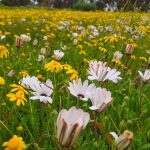
Tourism Month in South Africa, celebrated in September, shines a spotlight on the Western Cape as a premier lifestyle destination. The region offers a wide range of tourism experiences, each contributing to its unique charm.
From Wine Tourism and Food Tourism, which highlight the Cape’s rich agricultural bounty and world-class culinary scene, to Cultural Tourism, which invites visitors to explore the history, art, and heritage of the region, the Western Cape has something for every traveller. The most popular during this time of year is Flower Tourism, where the landscape comes alive with vibrant wildflower blooms, drawing visitors from near and far to witness this spectacular natural display. Additionally, Eco-Tourism and Agri-Tourism offer immersive experiences in nature and agriculture, while provides a tranquil escape for those seeking relaxation.

Flower Tourism is a vibrant part of the Western Cape’s appeal, especially during spring when the region comes alive with a dazzling display of wildflowers. Visitors flock to areas such as the West Coast and Namaqualand to witness this spectacular natural phenomenon, where fields are transformed into carpets of colourful blooms. The annual flower season, from August to September, draws nature lovers, photographers, and eco-tourists, offering guided flower walks and scenic drives through the Cape’s rich floral landscapes. This seasonal attraction adds yet another layer to the Western Cape’s diverse tourism offerings.
Wine Tourism stands at the forefront, with the Cape Winelands offering world-class wine-tasting experiences, cellar tours, and breathtaking vineyard landscapes. Wine lovers from around the globe are drawn to the Western Cape to indulge in the region’s exceptional wines, making it a cornerstone of the province’s tourism industry.
Food Tourism is equally vibrant. The region is known for its culinary excellence, with farm-to-table experiences, renowned restaurants, and local markets that celebrate the rich agricultural bounty of the area. Visitors relish the opportunity to taste the authentic flavours of the Cape, often paired with the region’s acclaimed wines.
Cultural Tourism adds depth to the visitor experience. The Western Cape is rich in history and culture, with opportunities to explore the region’s diverse heritage. Visitors can experience traditional Cape Dutch architecture, learn about local history at museums, and engage with the vibrant arts and crafts scene in towns like Stellenbosch, Franschhoek, and Cape Town. Cultural festivals, such as the Hermanus Whale Festival and the Klein Karoo National Arts Festival, also attract numerous tourists.

Eco-Tourism is a natural draw, with abundant conservation areas and breathtaking landscapes. Visitors can explore the Cape Floral Kingdom, a UNESCO World Heritage Site, or embark on whale-watching tours along the coast. The region’s national parks, such as Table Mountain National Park and the West Coast National Park, offer unique opportunities for responsible tourism.
 Agri-Tourism provides a unique opportunity to connect with the land and the people who cultivate it. Visitors can participate in farm stays, olive oil tastings, and harvest festivals, experiencing the region’s agricultural heart.
Agri-Tourism provides a unique opportunity to connect with the land and the people who cultivate it. Visitors can participate in farm stays, olive oil tastings, and harvest festivals, experiencing the region’s agricultural heart.
Wellness Tourism is on the rise, with visitors seeking relaxation and rejuvenation in the Western Cape. From luxurious spa retreats in the Winelands to yoga retreats in the mountains, the region offers a tranquil setting for wellness activities. Hot springs, wellness centres, and holistic health experiences add to the appeal.
These diverse forms of tourism reflect the Western Cape’s dynamic lifestyle, attracting visitors who seek more than just a vacation but an enriching journey into the soul of South Africa.

